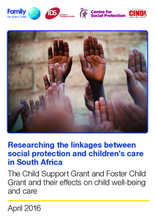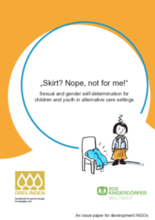Displaying 1691 - 1700 of 2221
This exploratory research involved focus group consultations with seven child and family welfare agencies to investigate the impacts, barriers, benefits and limitations of cultural support planning for Indigenous young people in, and leaving care in, Victoria.
This paper aruges that child welfare agencies (in the US) have an obligation to protect children’s physical and mental well-being, and the social work profession is uniquely qualified to deliver evidence-based obesity mitigation efforts among children in care.
In this qualitative study, 35 experienced foster parents in the US were interviewed "explored strategies that facilitate the functional adaptation of children transitioning into their care."
This report presents research on the impact of two cash transfer programs for vulnerable children in South Africa on children’s care.
This issue paper explores the experiences of lesbian, gay, bisexual, transgender and intersex (LGBTI) children and young people in alternative care settings and highlights some promising practices.
This study examined (1) how perceived social support (PSS) varied across orphan‐related characteristics (e.g., orphan status, such as single, maternal or paternal, and their living environments, such as in child‐headed households, on the street, in an orphanage or in a foster home) and (2) the relative importance of sources of PSS (relatives/community/adults and peers) and functional social support (emotional/informational/instrumental and social) and its association with emotional well‐being and mental distress.
This animated video describes Indonesia's Families First Signature Program which began in 2005. The goal of Families First is to ensure that every child in Indonesia has a safe, family environment, recognizing that family-based care is best for child development. The video describes how the Signature Program has helped shift care away from institutions towards family-based care.
Child Trends recently released three sets of child welfare fact sheets detailing child maltreatment, foster care, and adoption statistics from the United States for federal fiscal year (FFY) 2013. Each set of 52 fact sheets uses state and national data to tell a story about the U.S.'s most vulnerable children and youth, a story that varies dramatically by state.
This study explores the association of caregiver and child characteristics with educational outcomes for orphaned and abandoned children (OAC) in India.
This study focused on a particular dimension of teenage motherhood in foster care: participants' efforts to break the cycle of child abuse and neglect with their own children.


